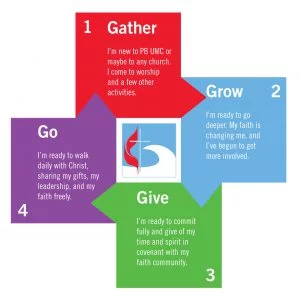Dear friends…
I was listening to a podcast where the interviewee – a well-known public figure – noted the importance of humility in leadership. This was framed through the notion that sometimes a leader will see themselves in a position of influence or leadership or power and wonder if they are in fact the best person for that role. As the interviewee explored this phenomenon, the explanation continued that this can be healthy and good when not carried to an extreme.
In a practical sense, this can be a recognition of one’s faults and/or natural limitations. A leader might say that she is not good at understanding complex data sets, and use that recognition to seek an assistant or advisor who can fill that need. This requires both humility and confidence.
I bring this up because I have been working at recognizing my own shortcomings. As a leader and as a Pastor, I find it important to understand my own limitations. I do this to help me see where the gifted voices of others might be invited into dialogue and effective ministry.
In a recent conversation with a congregation member, we were discussing my suggestion that we should take care to look people in the eye – even those situations where this might be uncomfortable. It was noted in our conversation that there are times that some circumstances where doing so might bring up important questions about safety. I recognize that my generalization may have given an impression that someone’s physical safety is less important, and this is not the case. I believe that we must work hard to see the humanity in one another, and I also recognize that sometimes we must take care to maintain our own physical safety. Usually these can both be accomplished, but not always.
In another conversation, I suggested that our congregation is not here to make us feel good but so that we might be enabled to serve our communities and the world. This is another case where a broad generalization was not the best way to frame an important concept. I talked this over with a group of leaders in our congregation, and we agreed that this congregation must be one where all are welcome no matter where we are on our spiritual journey. It is rare for someone to come to church and immediately wish to join a committee. More commonly, someone will come who is in need of care. I believe it is our responsibility to care for all who are in need.
In this, I find an important parallel with our critical Project Grace ministry. Each Wednesday night, we offer grace and care and comfort to people in need regardless of their circumstance. We also offer programs and guidance that can help people move from a place of need and to equip them to contribute to their communities. Shouldn’t our other ministries work the same way? If someone comes to worship in need of care and spiritual direction, we should be equipped to help offer these. We should also include programs and guidance that can help people move from a place of need and to equip them as disciples and leaders of ministry.
To this end, Adam Marshall-Lopez has created a new resource for information on our effort to help our congregation grow in our spirituality and discipleship. Please see Adam’s short write-up and website link on page 5 of the August 2019 Beach Breeze.
In what ways can we be humble and recognize our shortcomings? In what ways might we see our room for growth? In what ways might we intentionally prioritize our spiritual journey so that we become more fully committed disciples of Jesus Christ?
 I have previously suggested the following four steps, and I invite you to consider where you might be in this list (and how to move to the next):
I have previously suggested the following four steps, and I invite you to consider where you might be in this list (and how to move to the next):
- Gather – I’m new to PB UMC or maybe to any church. I come to worship and a few other activities.
- Grow – I’m ready to go deeper. My faith is changing me, and I’ve begun to get more involved.
- Give – I’m ready to commit fully and give of my time and spirit in covenant with my faith community.
- Go – I’m ready to walk daily with Christ, sharing my gifts, my leadership, and my faith freely.
As a community of faith, I believe we are on this journey together. When we have moved along these steps, our next expression can be to guide others along their parallel journey. In covenanting together in this way, we experience a collective community who supports and cares for one another in vital and life-giving ways. May we do so in authentic humility and confident in God’s grace.

Pastor Bob
